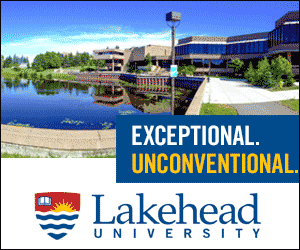Top-Notch Research with Small University Charm
February 28, 2015
The 2014 Research Infosource report recognized Lakehead University as one of the top two undergraduate research universities in Ontario and the top three in all of Canada. This ranking is particularly impressive for an institution of just 9,000 students. Indeed, Lakehead provides comprehensive academic programs with all the advantages of a small college.
The university is located in a city of 125,000 in Thunder Bay, with an extension campus in Orillia. The campus is on a nature preserve, where many students ski, camp, and sail on the weekends.
Lakehead offers the breadth of major programs typically available at larger universities, such as science, business, medicine, law, humanities, and social science. Engineering is a key area of study; other distinctive programs include natural resource management, forestry, and environmental science.
“We are both small and also diverse in having all kinds of programs, especially the professional programs that many of the students from Brazil are looking for,” noted Vice Provost International, Mr. Tony Williams.
Lakehead University


Lakehead University
Currently the third largest host of Science without Borders students in Canada, Lakehead has been involved in the program since its inception. The faculty has gone to great lengths to ease students’ transitions into Canadian university life by offering an on-campus coordinator in charge of hosting the SwB students. Lakehead also redesigned the admissions process with Brazilian students in mind. In addition to the typical September entrance, students can now begin engineering programs in January or apply for May and July intake.
Once Science without Borders students arrive on campus, they participate in an intensive English language program before taking on coursework in their areas of study. Students may also choose to start off with a lighter course load while taking English courses to continue improving their language skills.

Individual attention to students sets Lakehead University apart. The university organizes a pre-departure orientation in Brazil, meets students at the airport upon arrival, and coordinates an internship placement to complement their studies. Recent Science without Borders students worked on improving MRI machines to target areas affected by cancer.
In the next few years, the university hopes to expand the English language program, continue attracting Science without Borders students in a diversity of fields, and increase exchange by sending more Canadian students to Brazil.
Mr. Williams explained that the next phase in this cross-cultural exchange involves establishing a partnership with a Brazilian university. “We are looking for partners who reflect our university in the Brazilian context: smaller institutions that are focused on the same areas of study.”















